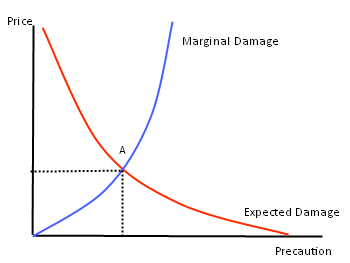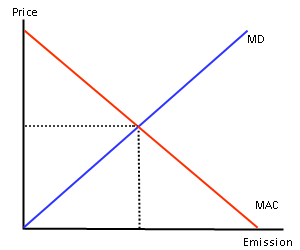Course:ECON371/UBCO2010WT1/GROUP1/Article4
Back to
Group 1
Article 4: Nigeria records 3,203 oil spillage cases in four years
Summary
According to this article, a recent report on oil spills in Nigeria (the most prolific oil producer in Sub-Saharan Africa), compiled by the National Oil Spill Detection and Response Agency (NOSDRA) indicates that a total of 3,203 oil spills have been recorded in the Niger Delta region in the last four years alone. Of the 3203 recorded spills, 23 percent were been caused by equipment failure, operational/maintenance error and corrosion while 45 per cent has been attributed to sabotage/vandalism.
The Nigerian government plans to impose strict anti-spillage rules on oil companies in the country and also to enforce strict compliance with environmental laws. Major stakeholders in the oil industry are to examine regulations for oil spill recovery, clean up, and remediation. As well they are to find ways to estimate the damage caused by the spills. They were also urged to abstain from polluting the environment so as to make it healthy and sustainable for living.
The Minister of the Niger Delta (the region in Nigera with the most recorded spills) says the ministry is working hard to make sure oil companies work in a very stable and peaceful environment. With help from both the European Union and UNDP, the ministry hopes to create a proposition that outlines the major issues in the Niger Delta, and the approximate costs to fix them, in order to raise funds for the development of the region.
The article also mentions the fact that Chevron-Nigeria enjoys good working relationship with its host communities because of their consistent commitment to meet their coporate social responsibilities.
***The last portion of the article was not included, as it pertains to the NUPENG strike, and not the issues our group is focussing on.***
Analysis of Article
The large amount to oil spillage within the last four years is largely due to a lack of political infrastructure. This lack of structure combined with minimal resources makes the monitoring and regulation of companies difficult. The government will have to implement a form of tax directed towards the firms and general population, in order to fulfill the enforceability requirement of any regulation.
Even though 23% may seem like a small proportion of the spills, 23% of 3203 translates to 723 oil spills, or more than one, every two days. The 45% of spills due to vandalism and sabotage, and the remaining unclassified 32% of the spills may also have been partially preventable by some act on the part of the oil companies. Oil spills are generally unexpected events. The level of precaution taken needs to be at the intersection of the marginal damage, and expected damage curve to be efficient. (Graph on left) This is not necessarily the case in Nigeria. If companies fail, or choose to pay for a lower level of precaution by not doing things such as improving equipments or labor skills, they must be prepared to incur the associated consequences. Whereas the cost of improving equipments in the short run is known, and can be high, the marginal damage of an oil spill depends on amount of oil being spilled. It can range from a few thousand, in the case of an overturned truck, to billions, such as the spill in the Nigerian village of Otuegwe. This shows that precaution level in Nigeria is not at an efficient level. In the long run, improved equipment, and educational programs will reduce the amount of oil spills, which will reduce the marginal cost.
Nigerian oil companies obviously spend some amount on precaution measures to reduce the expected number, and impact of oil spills; however, given the large number of spills, this is obviously not a large enough amount. The catastrophic quality of oil spills generally means that they are unexpected by society. The large number of spills in Nigeria however, (again, one every two days) in some sense changes the expected damage of an unpredicted oil spill into a constant level of emissions- the management of which can be displayed with a marginal abatement cost curve. (Graph on right)
A solution to oil spills caused by equipment failure could be reduced by investing heavily in more advance equipment to increase the precaution level but at a higher expense. The expense of the equipment, or at the very least the expense of the enforcement of the new regulations may be paid partially by tax payers. This will not necessarily be successful since tax payers may consider this unfair as they are not the ones producing the pollution.
Whether the oil spills will be reduced or not, the total social costs will be paid by the citizens, governments, and possibly other neighbor countries. Even if these events subside, Nigeria will still need time to restore the environment and develop a balanced trading relationship with other countries.
Prof's Comments
You've got the precaution axis right, but label one of the lines wrong. Marginal damage declines as precaution increases, while marginal abatement cost - marginal precaution cost it could be called - increases with the amount of precaution.
An important issue in situations like this is the context. Niger is a low income nation. For the people of Niger, the tradeoff may be acceptable. At the very least, the damages are worth less because the people cannot pay as much to avoid them. While we may have an ethical issue with this, remember that willingness to pay follows from ability to pay. Thus, this may also relate to the Environmental Kuznets Curve, which we talked about earlier in the term. Poor nations may accept a deteriorating environment in order to boost income. When they get richer, the demand for a clean environment grows.
Conclusions
As this article shows, leaks and spills are commonplace in some parts of the world, but often receive little global attention. More oil is spilled as a result of the Niger Delta's oil production every year than has been lost in the Gulf of Mexico so far. The Niger delta has over 600 oilfields and supplies 40% of all the crude the United States imports. This oil comes at a high price - an estimated 1.5 million tons of oil has been spilled in the delta over the past half century.
As the article mentions, close to half of these spills are caused by vandalism and sabotage from the people. This is because while the area is so rich in oil, little of the financial benefits filter down to the people as the profits wind up in the hands of a few or go off-shore. The people retaliate at the government through vandalism and theft. Many of them live through the resulting damage from the oil spills, but reap none of the benefits of the oil production.
Another major cause of spills, is corroded pipes that remain unrepaired for years. The scars of the numerous spills are self evident to any observant individual in the loss of fauna and flora, absence of marine life including fish, shrimp, crabs among others, as well as black brackish waters covered with films of oil, and discolored swamp vegetation.
Nigeria has environmental laws in place, but lack the discipline to enforce this laws. The multinational oil companies also take advantage of these unregulated laws. In the long run, Nigeria will have to re-evaluate its political structure and examine a tax and regulation will be employed and enforced. The citizens and government will have to endure the social cost to reduce the amount of oil spilt each year. In the long run the oil industry will have a more efficient level of production and will do less damage to the environment.
Nigeria will also have to promote and to educate the importance of of environmental protection using advanced technology, equipment, and a continuous report of oil split. Also, they will have to illustrate the relatively small short run cost of improved levels of precaution and abatement in comparison to the devastating costs of the oil spills. Citizens, capital owners, and the government will benefit from this change.
As a final note, is also beneficial to note that oil companies such as Chevron, and Exxon Mobil in Lagos are doing their part to effectively clean their offshore spills. This is an image that other large oil producers in the area should aim to model themselves after.

